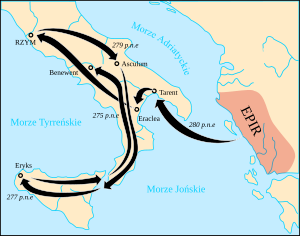Battle of Asculum
| date | 279 BC Chr. |
|---|---|
| place | near Asculum, today Ascoli Satriano in Apulia , Italy |
| output | Epirotic Victory (a " Pyrrhic Victory ") |
| Parties to the conflict | |
|---|---|
|
Epirus , and the Italic peoples of the Taranto , Oscar and Samnite |
|
| Commander | |
| Troop strength | |
| over 40,000 men (7 legions) | 40,000 men, 20 war elephants |
| losses | |
|
over 6,000 dead |
approx. 3,500 dead |
The battle of Asculum (or Ausculum ) took place in 279 BC. Near the present city of Ascoli Satriano and was fought between the Romans and the king of the Molossians , Pyrrhus of Epirus (319–272 BC).
The battle was the last battle won by Pyrrhus, who had come to Italy with 25,000 men and 20 war elephants . After the victory against the Romans in the Battle of Heraclea , Pyrrhus hoped for support from apostate Roman allies, which, however, largely failed to materialize. About 15,000 former allies of Pyrrhus joined, but the latter had hoped for more.
King Pyrrhus was able to win the battle of Asculum, but with even greater losses than at Heraclea . These high losses ultimately led to the fact that he won several battles, but not the war ( Pyrrhic victory ). The subsequent defeat at Maleventum (also called the Battle of Beneventum ) in 275 BC. Chr. Finally sealed his fate.
Web links
- Archaeological research in Ascoli Satriano (Asculum) - information from the University of Innsbruck
